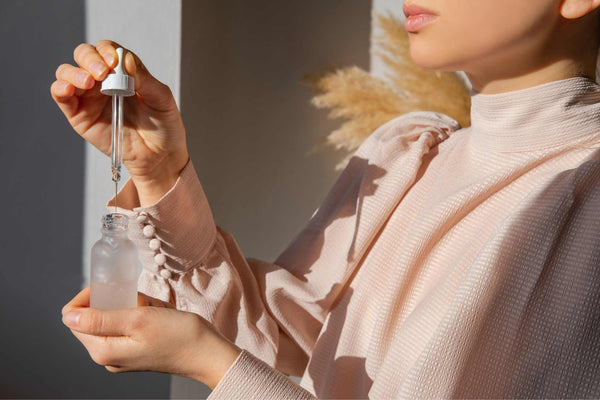Look Radiant During Menopause

Although at times we might feel like we're radiating enough heat to keep the whole house warm, today we're talking about radiating beauty. We're used to switching up our skincare routine with the seasons, but if you're also coping with menopause symptoms, you'll be facing a few more changes to your skincare style. As women go through menopause, our bodies undergo significant changes, including changes to our skin.
These changes are largely due to a decrease in oestrogen production, which can lead to dryness, thinning, and increased sensitivity. This hormonal shift can have a significant impact on our skin, causing it to become more prone to wrinkles, age spots, and other signs of ageing.
Oestrogen plays a key role in the production of collagen, elastin and hyaluronic acid - terms that are regularly used by beauty brands promoting skincare products for women in midlife. Collagen production falls due to the ageing process regardless of menopause (it's why men get jowly as they age), however an extra 30% is lost during the first five years of the change. The Chocolate blend of The MenoShake includes marine collagen to help replace some of this loss, and Vitamin C to boost the production of bright, healthy, collagen-rich skin cells.
There are several steps that women can take to care for their skin during menopause and minimise the effects of hormonal changes. With the right skincare routine, women can combat these effects and keep their skin looking healthy and vibrant. In this article, we will discuss the best skincare practices for women in menopause.
- Cleanse Gently
- Moisturise Regularly
- Use Sunscreen Daily
Sun damage is one of the primary causes of premature ageing, and it’s important to protect your skin from the sun’s harmful UV rays. This is especially true during menopause, when the skin becomes more vulnerable to damage.
Choose a broad-spectrum sunscreen with an SPF of 30 or higher, and apply it every day, even on cloudy or overcast days. Be sure to apply sunscreen to all exposed areas of skin, including your face, neck, chest, and hands. Using a SPF daily on your face, neck and hands (yes, even in the winter) will keep sun damage at bay and help prevent sunspots which are a tell-tale sign of ageing.
- Exfoliate Regularly
- Hydrate from the Inside Out
Drinking plenty of water is essential for keeping your skin hydrated and healthy. As women go through menopause, their bodies may become dehydrated more easily, so it is important to drink plenty of water throughout the day. You may also want to increase your intake of hydrating foods like fruits and vegetables.
- Incorporate Retinol and Hyaluronic Acid

- Consider Hormone Replacement Therapy (HRT)
Hormone replacement therapy (HRT) is a medical treatment option that involves taking oestrogen and sometimes progesterone to help alleviate the symptoms of menopause, including changes to the skin. By replacing the hormones that the body is no longer producing, HRT can help to increase collagen production, reduce the appearance of wrinkles, and improve skin elasticity. Talk to your doctor about whether HRT is right for you, and what type of therapy would be most appropriate. It can be an effective option for women who are experiencing severe symptoms, including dry skin. HRT can be administered in several forms, including pills, patches, gels, and creams.
- Eat a healthy diet
- Fruits and vegetables: These are rich in vitamins and antioxidants that protect the skin from damage and promote collagen production.
- Whole grains: These provide complex carbohydrates that help to regulate blood sugar and support healthy skin.
- Lean protein: This helps to build and repair the skin’s tissues.
- Healthy fats: These provide essential fatty acids that help to maintain the skin’s moisture barrier.

- Manage Stress
- Increased inflammation
When we experience stress, our bodies release a hormone called cortisol. Cortisol is a natural anti-inflammatory, and in small amounts, it can be beneficial. However, when cortisol levels are chronically elevated due to stress, it can lead to increased inflammation in the body, including the skin. This can exacerbate existing skin conditions like acne, rosacea, and eczema, and can also contribute to premature ageing.
- Reduced collagen production
- Impaired barrier function
The skin has a natural barrier function that protects it from environmental stressors like pollution and UV radiation. This barrier is composed of lipids and proteins that help to retain moisture and prevent irritants from penetrating the skin. However, stress can impair this barrier function, making the skin more vulnerable to damage and dehydration. This can lead to dryness, flakiness, and increased sensitivity.
- Increased sebum production
Stress can also affect the sebaceous glands, which produce the skin’s natural oils. In some people, stress can cause the glands to produce more sebum, leading to oily skin and acne breakouts.
- Poor sleep quality
Stress can interfere with sleep quality, which can have a negative impact on the skin. During sleep, the body produces collagen and repairs damage to the skin. If sleep is disrupted, this process may not occur as effectively, leading to dull, tired-looking skin.
- Unhealthy coping mechanisms
Finally, it’s worth noting that stress can lead to unhealthy coping mechanisms, such as smoking, drinking alcohol, and eating a poor diet. All of these behaviours can have a negative impact on the skin, exacerbating existing skin conditions and accelerating the ageing process.
In summary, so many aspects of menopause health involve adding to your routine, so it's a relief to find that menopausal skincare is actually quite simple. Just make sure you get enough exercise, eat a healthy diet and take the MenoShake daily for that all-important nutritional boost. Make sure that you try to get enough sleep, exercise regularly, and eat a balanced diet. Stress can have a significant impact on the skin of women in menopause, so try to minimise its effects, by practising stress-reducing techniques such as meditation, yoga, and deep breathing. Finally, be sure to moisturise daily, use sun protection and introduce two or three topical treatments such as Retinol and Hyaluronic Acid. A simple hydrate and protect regimen will help you to look radiant on the outside as you go through midlife.


Leave a comment
Please note, comments must be approved before they are published